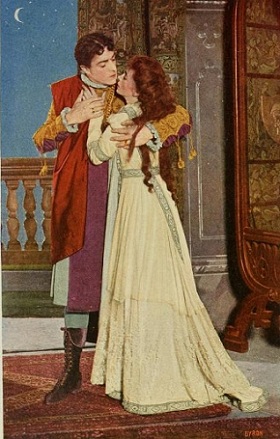Romeo and Juliet Study Guide
 Romeo and Juliet: The Complete Annotated Play Romeo and Juliet: The Complete Annotated Play
 Romeo and Juliet: Examination Questions and Answers Romeo and Juliet: Examination Questions and Answers
 Costume Design for a Production of Romeo and Juliet Costume Design for a Production of Romeo and Juliet
 Themes in Romeo and Juliet Themes in Romeo and Juliet
 Shakespeare on Fate Shakespeare on Fate
 The Five Stages of Plot Development in Romeo and Juliet The Five Stages of Plot Development in Romeo and Juliet
 Annotated Balcony Scene, Act 2 Annotated Balcony Scene, Act 2
 Blank Verse and Rhyme in Romeo and Juliet Blank Verse and Rhyme in Romeo and Juliet
 Sources for Romeo and Juliet Sources for Romeo and Juliet
 Romeo and Juliet Plot Summary (Acts 1 and 2) Romeo and Juliet Plot Summary (Acts 1 and 2)
 Romeo and Juliet Plot Summary (Acts 3, 4 and 5) Romeo and Juliet Plot Summary (Acts 3, 4 and 5)
 Romeo and Juliet and the Rules of Dramatic Tragedy Romeo and Juliet and the Rules of Dramatic Tragedy
 Romeo and Juliet: Teacher's Notes and Classroom Discussion Romeo and Juliet: Teacher's Notes and Classroom Discussion
 Romeo and Juliet Essay Topics Romeo and Juliet Essay Topics
 How to Pronounce the Names in Romeo and Juliet How to Pronounce the Names in Romeo and Juliet
 Introduction to Romeo Introduction to Romeo
 Introduction to Juliet Introduction to Juliet
 Introduction to Mercutio Introduction to Mercutio
 Introduction to Friar Laurence Introduction to Friar Laurence
 Introduction to The Nurse Introduction to The Nurse
 Introduction to Paris Introduction to Paris
 Introduction to The Montagues and the Capulets Introduction to The Montagues and the Capulets
 Famous Quotations from Romeo and Juliet Famous Quotations from Romeo and Juliet
 Stage History of Romeo and Juliet Stage History of Romeo and Juliet
 All About Queen Mab All About Queen Mab
 Why Shakespeare is so Important Why Shakespeare is so Important
 Shakespeare's Language Shakespeare's Language
 Shakespeare's Boss: The Master of Revels Shakespeare's Boss: The Master of Revels

|
In the Spotlight
Featured Quote
 Take him and cut him out in little stars, Take him and cut him out in little stars,
And he will make the face of heaven so fine
That all the world will be in love with night
And pay no worship to the garish sun.
Romeo and Juliet (3.2), Juliet
Many people are curious about Romeo and Juliet and its connection to the Kennedy family. In his tribute to John F. Kennedy at the Democratic National Convention in 1964, Robert Kennedy quoted the passage above:
"When there were periods of crisis, you stood beside him. When there were periods of happiness, you laughed with him. And when there were periods of sorrow, you comforted him. I realize that as individuals we can't just look back, that we must look forward. When I think of President Kennedy, I think of what Shakespeare said in Romeo and Juliet." Read on...
____
|
Points to Ponder
 Two households, both alike in dignity, Two households, both alike in dignity,
In fair Verona, where we lay our scene,
From ancient grudge break to new mutiny,
Where civil blood makes civil hands unclean.
From forth the fatal loins of these two foes
A pair of star-cross'd lovers take their life;
Whose misadventured piteous overthrows
Do with their death bury their parents' strife.
Romeo and Juliet (1.1), Prologue
"It may be said that in this more than in any other play Shakespeare comes near to being a commentator on himself, and to giving us his own authority for the true interpretation. In the prologue it is the author who speaks: this opening of the plot exhibits, not sin and its consequences, but a suggestion of
entangling circumstance; when he speaks of the "fatal loins" of the parents, the "star-cross'd lovers," and their "misadventured
piteous overthrows," Shakespeare is using the language of destiny and pathos. For what is spoken in the scenes the speakers alone
are responsible; yet a succession of striking passages has the effect of carrying on the suggestion of the prologue - dramatic foreshadowings, unconscious finger-pointings to the final tragedy, just like the shocks of omen that in ancient drama brought out the irony of fate." [Richard G. Moulton, The Moral System of Shakespeare]
_______
|
|
